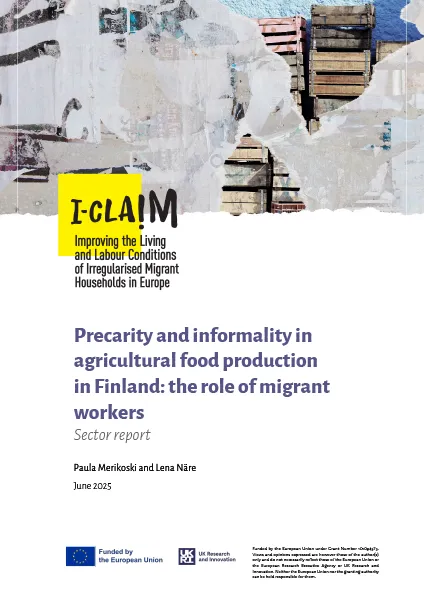Precarity and informality in agricultural food production in Finland- the role of migrant workers
Paula Merikoski, Lena Näre
How to cite:
Merikoski, P., and Näre, L. (2025) Precarity and informality in agricultural food production in Finland: the role of migrant workers. I-CLAIM. DOI: https://zenodo.org/records/15775571
Precarity and informality in agricultural food production in Finland- the role of migrant workers
Paula Merikoski, Lena Näre
Agricultural food production in Finland is largely dependent on the availability of foreign labour, especially seasonal labour, a development that began in the 1980s and 1990s and has intensified over the past three decades (Heikkilä 2020). While the tendency in Finnish migration policy is to restrict access to humanitarian, family and – to an extent – labour-based residence permits (Merikoski et al. 2024), certain types of work in the agricultural sector have been opened to non-EU labour forces through policy adjustments that have made the bureaucracy around obtaining work permits easier. In this report, we focus on two types of labour within the sector of agricultural food production, where the share of the migrant labour force is significant: seasonal work in open field berry production and greenhouse vegetable production, in which workers are employed both year-round and seasonally.
This report is based on an ethnographic study focused on the experiences of migrant workers in agricultural food production in Finland. The purpose of our study was to examine how an irregular, precarious and/or temporary migration status affects migrants’ working conditions, livelihoods and living conditions and how the informality of their work arrangements impacts their everyday lives and residence status. By interviewing both migrant workers and sector stakeholders and conducting participant observation, we gathered data that allowed us to approach the intertwinement of migrants’ work, everyday lives, living conditions and the associated irregularities from multiple perspectives. In addition to these data, we had access to labour inspection reports and other documents, which shed light on the issues typical to the sector. We also relied on informal conversations, observations and notes taken during field trips.
Undeclared work or work done without a contract is relatively rare in Finnish labour markets, and most migrant workers hold valid residence and work permits. However, certain irregularities in work arrangements are prevalent even if the employment is formal on paper. For example, we found that many workers earned money informally alongside their regular employment, or sometimes they worked for a different employer than that on their permit papers. Employers cutting corners or breaching the regulations of collective agreements , for instance, by not paying the required extra wages for weekend work, were typical. Moreover, regularisation through work ties workers to their employers, which can cause vulnerabilities. In our analysis, we discuss the impact of these irregularities on the financial situation and residence status of workers as well as the resistance strategies employed by workers. We further examine the impact working conditions have on migrant workers’ families, personal lives, housing, health and access to welfare rights.
